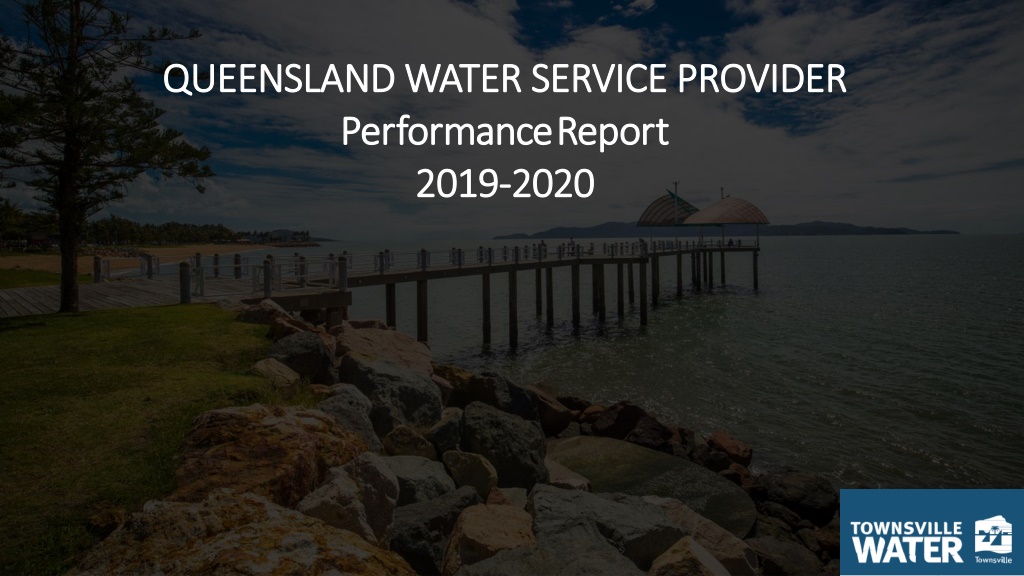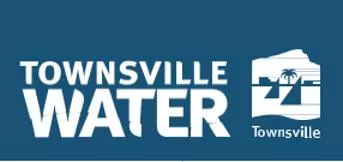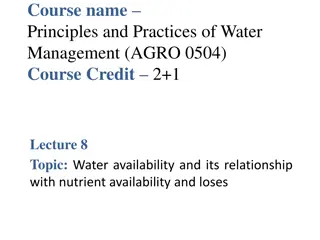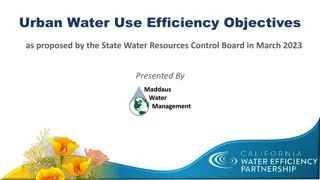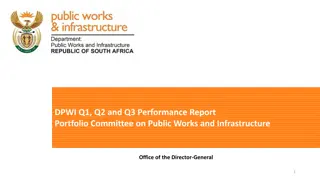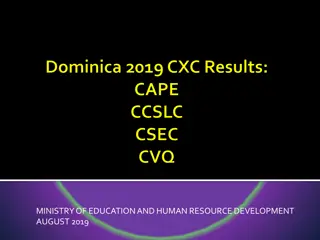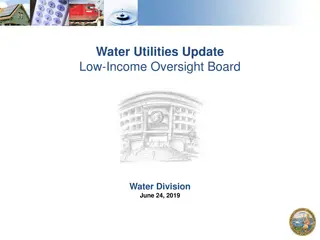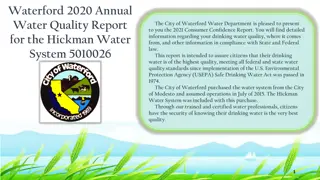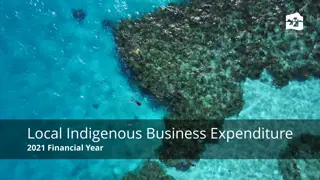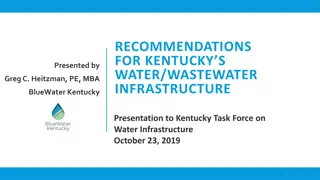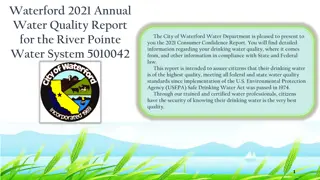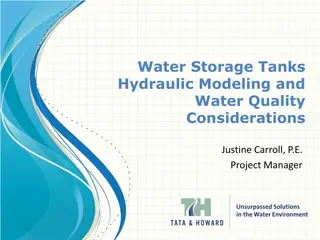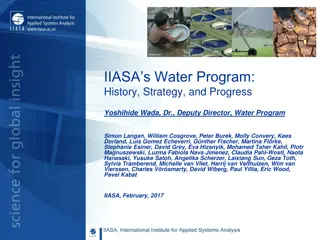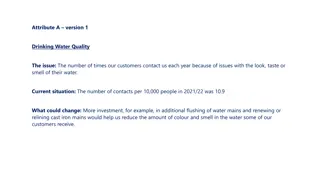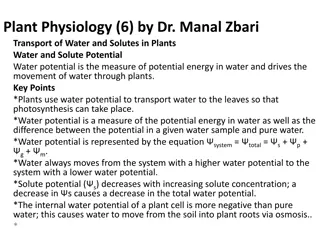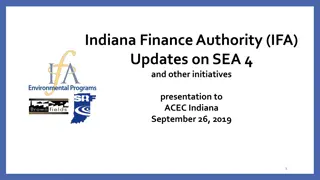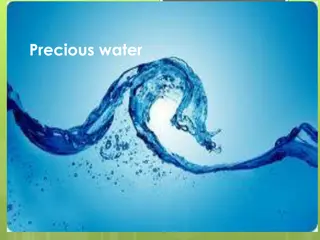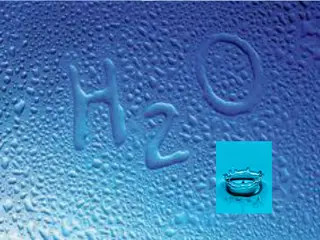Townsville Water Service Performance Report 2019-2020
Townsville Water provides drinking water and sewerage services to around 190,000 residents through various schemes and infrastructure. The performance report outlines key indicators in General, Water Security, Customers, and Finance categories for the 2019-2020 fiscal year. Challenges such as drought conditions and a major flood event impacted service provision, leading to ongoing water conservation measures until infrastructure improvements are completed. The report emphasizes transparency, accountability, and commitment to delivering safe, high-quality drinking water in compliance with regulations.
Uploaded on Sep 25, 2024 | 0 Views
Download Presentation

Please find below an Image/Link to download the presentation.
The content on the website is provided AS IS for your information and personal use only. It may not be sold, licensed, or shared on other websites without obtaining consent from the author.If you encounter any issues during the download, it is possible that the publisher has removed the file from their server.
You are allowed to download the files provided on this website for personal or commercial use, subject to the condition that they are used lawfully. All files are the property of their respective owners.
The content on the website is provided AS IS for your information and personal use only. It may not be sold, licensed, or shared on other websites without obtaining consent from the author.
E N D
Presentation Transcript
QUEENSLAND WATER SERVICE PROVIDER QUEENSLAND WATER SERVICE PROVIDER P Pe er rf fo or rm man anc ce e R Rep 2019 2019- -2020 epo or rt t 2020
Table of Contents Summary .. 3 Water Security Series .. . . 9 Purpose of this Performance Report .. 3 Key findings .. . 9 Overview of Townsville Water s RESULTSFORWATERSECURITYSERIES .. 10 Operations and Services .. 4 Finance Series 10 WATERSUPPLY .. . .... 4 Key findings . 11 SEWERAGESERVICES . . 5 RESULTSFORWATERSECURITYSERIES 12 Explanation of Key Performance Customer Series 13 Indicator Groups . 6 Key findings . 13 1 series general . 6 PRICING . .. 13 2 series water security . .. . 6 SERVICEINTERRUPTION . 13 3 series finance . . 6 RESPONSETIMES . . 13 4 series customer . 6 COMPLAINTS .. 13 General Series .. 7 RESULTSFORCUSTOMERSERIES . .. 14 Key finding 7 POTABLEWATERSUPPLY . . 7 Conclusion 15 SEWAGECOLLECTIONANDTREATMENT .. . . 7 RESULTSFORGENERALSERIES ... 8 Queensland Water Service Provider Performance Report 2019-2020
Summary Summary Townsville Water is committed to consistently providing drinking water and sewerage services that meet customer, legislative and regulatory requirements. Townsville Water monitors its performance and reports annually to the Queensland Department of Natural Resources, Mines and Energy on a number of key performance indicators nominated by the Department. This Performance Report outlines Townsville Water s performance during the 2019/2020 financial year in four Key Performance Indicator Groups: General, Water Security, Customers, and Finance. During the financial year, Townsville Water faced several challenges to the provision of its drinking water and sewerage services. Following 2017/2018 drought conditions the 2018/2019 1/500 year flood event occurred having a significant impact to the Townsville community. In order to preserve the water supply, water conservation measures have remained in place since March 2019. These conservations will continue to remain in place with until the completion of the Haughton Pipeline Duplication. Purpose of this Performance Report As a drinking water and sewerage service provider under the Water Supply (Safety and Reliability) Act 2008, Townsville Water are required to prepare this annual report on its performance against a number of key performance indicators nominated by the Queensland Department of Natural Resources, Mines and Energy. Townsville Water is committed to transparency and accountability of its performance, and it will publish this Performance Report on council s website, to promote free and easy access by Townsville Water s customers and the community, and to meet legislative requirements. The Queensland Department of Natural Resources, Mines and Energy will use the information supplied within this Performance Report to compare the performance of water service providers across the State of Queensland. Townsville Water is committed to providing safe, high quality drinking water and manages its supply of drinking water in accordance with the Australian Drinking Water Guidelines and its approved Drinking Water Quality Management Plan. Queensland Water Service Provider Performance Report 2019-2020
Water Supply Water Supply Townsville Water Townsville Water Townsville Water services a population of approximately 190,000 residents by way of three drinking water schemes - Townsville Drinking Water Scheme, Paluma Township Drinking Water Scheme and Giru/ Cungulla Drinking Water Scheme. To deliver its water services, Townsville Water operates and maintains 2 dams, 2 weirs, 4 water treatment plants, 27 water pumping stations, 41 reservoirs (water storage facilities) and over 2,600 km of water distribution mains. is a significant business activity of the Townsville City Council, providing water and wastewater services to the Townsville community. It supplies potable water and treats wastewater and supplies recycled water for irrigation purposes only. The Townsville Drinking Water Scheme is the predominant scheme, supplying approximately 98% of all water connections in the Townsville region. The major water source for the Townsville Drinking Water Scheme is the Ross River Dam which delivers water to the Douglas Water Treatment Plant. With a maximum capacity of approximately 233,000 megalitres, the Ross River Dam supplies about 85% of Townsville s water. A smaller dam with a capacity of 11,000 megalitres; Paluma Dam, also services the Townsville Drinking Water Scheme by providing water to Northern Water Treatment Plant for distribution to the northern areas of the Townsville City Municipality. During extended drought periods, if the water level in the Ross River Dam is low, supplementary water supply is sourced from the Burdekin Dam via the Haughton Irrigation Channel, Haughton Pipeline and pumping station under an agreement with Sunwater. To supply the Giru/Cungulla Drinking Water Scheme, water is taken from the Haughton River and delivered to a small treatment plant at Giru before distribution to Cungulla residents and sale to the Burdekin Shire Council for Giru residents. To supply the Giru/Cungulla Drinking Water Scheme, water is taken from the Haughton River and delivered to a small treatment plant at Giru before distribution to Cungulla residents and sale to the Burdekin Shire Council for Giru residents. To supply the Paluma Township Drinking Water Scheme, water is taken from an unnamed rainforest creek to supply the small Paluma Township population. Incidentally, Townsville Water supplies a small amount of nonpotable water each year. Other than the Paluma Township Drinking Water Scheme, the nonpotable scheme only services a small population. This is either supplied nonpotable water from bulk pipelines before the water reaches a treatment plant, or this receives water that has been through a treatment process where the supply has been classified as a supply of nonpotable water on the basis of chlorine decay in the pipeline. In this case, the water no longer meets the quality requirements to be considered as potable water and is only supplied for purposes other than drinking water. Queensland Water Service Provider Performance Report 2019-2020
Sewerage Services Sewerage Services Townsville Water collects and treats wastewater from across the Townsville Region, servicing a population of approximately 75,000. Sewage is collected and transported via approximately 1,360 kilometers of sewer main and over 180 sewage pumping stations to 6 wastewater treatment plants on the mainland and Magnetic Island for treatment. At most wastewater treatment plants, Townsville Water undertakes additional treatment processes to produce recycled water, which is used for irrigation purposes either onsite at wastewater treatment plants or for use as irrigation for open space areas or sporting fields. Townsville Water has Quality and Environmental Management Systems in place to ensure public health and safety, environmental sustainability, and compliance with legislative and regulatory requirements. Townsville Water holds Environmental Licences for each of its sewage treatment plants and other aspects of its sewage collection system. Queensland Water Service Provider Performance Report 2019-2020 M Mou oun nt t S St t J Jo oh hn n S Sew ewa ag ge e T Tr re ea at tm me en nt t P Pla lan nt t
Explanation of Key Performance Indicator Groups Explanation of Key Performance Indicator Groups 1 series general The first series of Key Performance Indicators collect data on general service delivery in Queensland, including information on infrastructure for providing water or sewerage services, volumes of water sourced per reporting period by service providers, numbers of properties serviced, and volumes of water supplied to properties. 2 series water security The second series of Key Performance Indicators collects data on water security and how service providers ensure short- and long-term water supply to customers. Given the climatic variability in Queensland, service providers must commit to long-term planning to ensure the ongoing continuity of their supplies to customers. These Key Performance Indicators provide valuable information regarding water demand, water restrictions and water security, both now and into the future. 3 series finance The third series of Key Performance Indicators provides data on service provider financial sustainability for water and sewerage services. 4 series customer The fourth series of Key Performance Indicators provides data on water and sewerage charging and customer standards, including indicators relating to billing, mains breaks, incident response times, interruptions and customer complaints Queensland Water Service Provider Performance Report 2019-2020 Douglas Water Treatment Plant Douglas Water Treatment Plant
General Series General Series Key findings Key findings POTABLE WATER SUPPLY In 2019/2020, Townsville Water, treated and supplied more water than in the prior financial year. This is a result of the dam reaching capacity during the flooding event in 2018/2019 and water restrictions being reduced to Water Conservation levels in March 2019, increasing water usage by 23% . Townsville Water produced over 52,000 mega litres of safe high-quality potable water from its treatment plants and processes during the financial year. It supplied over 29,000 mega litres for residential purposes to over 81,000 residential customer connections, and over 12,000 mega litres for commercial, municipal and industrial purposes to nearly (5000 last year) non-residential customer connections. The highest demand for water that Townsville Water experienced in Quarter 4 within the 2019/2020 financial year was 182 megalitres. Which is slightly higher than last years 164 megalitres. SEWAGE COLLECTION AND TREATMENT In 2019/2020, Townsville Water collected and treated approximately 17,000 mega litres of sewage from Townsville properties. Approximately 15,000 mega litres of sewage was collected from residential, non-residential and non-trade waste sources. It is estimated based upon water consumption, that approximately 2,220 megalitres of wastewater were collected from approximately 3000 trade waste customers. The majority of sewage was treated at Townsville Water s two largest treatment plants, Cleveland Bay Purification Plant and Mount Saint John Treatment Plant. After treating approximately 17,000 mega litres of sewage across all plants, around 16,000 mega litres of treated effluent was disposed of, predominately to ocean or local waterways. Prior to disposal, wastewater is treated to a high standard in accordance with environmental licence conditions. In 2019/2020, Townsville Water produced over 1,300 mega litres of recycled water, with the majority being reused for irrigation purposes either onsite at wastewater treatment plants or supplied for use as irrigation for open space areas or sporting fields. Queensland Water Service Provider Performance Report 2019-2020
RESULTS FOR GENERAL SERIES SWIM CODE KPI CODE INDICATOR TITLE TOWNSVILLE POTABLE TOWNSVILLE NON POTABLE CLEVELAND BAY REUSE CONDON REUSE HORSESHOE BAY REUSE MAGNETIC ISLAND REUSE MOUNT ST JOHN REUSE TOWNSVILLE SEWERAGE TOWNSVILLE WSP-WIDE COMMENTS AS2 QG 1 .1 Length water mains 2,638 km 4,326 km 4 km 3 km 3 km 1 km 5 km 2,658 km AS5 QG 1 .2 Length sewerage mains and channels 1,364 km 1,364 km AS4 QG 1 .3 Number sewage treatment 6 sewage treatment plants 6 sewage treatment plants plants AS1 QG 1 .4a Number water treatment plants: providing full treatment 4 Water treatment plants 4 water treatment plants AS47 QG 1 .4b Capacity of water treatment plants 277 ML per day 277 ML per day WA201 QG 1 .5 Maximum daily demand 239 ML 239 ML WA74 QG 1 .6 Volume potable water produced/supplied into water supply system Water restrictions have eased to Water Conservation Measures. Due to this water usage has risen throughout Townsville. 5,2417 ML 52,417 ML AS48 QG 1 .7 Total drinking water storage volume 263 ML 263 ML WA1 QG 1 .8 Volume water sourced: surface water 54,666 ML 54,666 ML WA2 QG 1 .9a Volume water sourced: groundwater No groundwater sourced No groundwater sourced No groundwater sourced WA45 QG 1 .9b Volume water sourced: 1,120 ML 1,120 ML imported WA61 QG 1.10 Volume water sourced: desalination marine water No marine water sourced No marine water sourced No marine water sourced WA26 QG 1.11 Volume recycled sewage supplied: all 617 ML 719 ML 693 ML 1,383 ML WA7 QG 1.12 Volume water sourced 55,786 ML 617 ML 719 ML 693 ML 57,169 ML CS2 QG 1.13 Connected residential properties: water 81,394 connections 81,378 ML 1.6 connections CS3 QG 1.14 Connected non-residential properties: water 4,903 connections 4,903 connections CS6 QG 1.15 Connected residential properties: sewerage 71,453 connections 71,453 connections CS7 QG 1 .16 Connected non-residential properties: sewerage 3,560 connections 3,560 connections Queensland Water Service Provider Performance Report 2019-2020
RESULTS FOR GENERAL SERIES Swim code KPI code Indicator Title Townsville Potable Townsville Non Potable Cleveland Bay Reuse Condon Reuse Horseshoe Bay Reuse Magnetic Island Reuse Mount St John Reuse Townsville Sewerage Townsville WSP- WIDE Comments WA32 QG 1 .17a Volume of potable water supplied - residential 29,535 ML 29,535 ML WA91 QG 1 .17b Volume of non-potable water supplied - residential 10 ML 10 ML WA34 QG 1 .18a Volume of potable water supplied - commercial, municipal and industrial 12,682 ML 12,682 ML WA92 QG 1 .18b Volume of non-potable water supplied - commercial, municipal and industrial 0 ML WA36 QG 1 .19 Volume of non-revenue water 10,079 ML 10,199 ML WF1 QG 1 .20 Total Full-Time Equivalent water and sewerage services employees 290 full time equivalent employees Water Security Series Water Security Series Key findings Key findings Providing water security to Townsville is a priority of the Townsville City Council. The level of Townsville s main water source, the Ross River Dam reached capacity during the 2019/2020 financial year with unprecedented rainfall during January and February of 2019. As a result in March 2019 The Townsville city Council moved from water restrictions to water conservation measures, these measures remained in place for 2019/2020 financial year. Prior to this in August 2016 water restrictions increased to Level 3 with the Ross Dam level falling below 20%. When significant rainfall fell during February/March 2018 water restrictions were eased back to Level 2, allowing residents more freedom in using water. Restrictions remained in place ensuring sustainable supply in the Ross River Dam until the Horton Pipeline Duplication is completed. Townsville Water is committed to managing its water supply infrastructure on a long term basis, to ensure a secure water supply for the community into the future. Townsville Water is currently in the process of building the recommended additional 1,800mm diameter steel pipeline with additional pumps from the Haughton Pump Station to the Ross River Dam, and to increase the capacity of the existing Sunwater pump station and gravity channel from Clare to the Haughton Pump Station by 234ML/day. Construction work on the Haughton Pipeline Duplication is estimated to be completed in 2021. Queensland Water Service Provider Performance Report 2019-2020
RESULTS FOR WATER SECURITY SERIES SWIM CODE KPI CODE INDICATOR TITLE TOWNSVILLE POTABLE TOWNSVILLE NON POTABLE TOWNSVILLE WSP-WIDE COMMENTS QG 2 .1 WS3 Available contingency supplies Yes Yes QG 2 .2 Water restriction duration: PWCM 365 365 WS11 QG 2 .3 WS12 Water restriction duration: Level 1 0 0 0 QG 2 .4 WS13 Water restriction duration: Level 2 0 0 0 QG 2 .5 WS14 Water restriction duration: Level 3 0 0 0 QG 2 .6 QG 2 .7 Water restriction duration: Level 4 0 WS15 0 0 Water restriction duration: Level 5 WS16 0 0 0 QG 2 .9 Has asset management planning been undertaken in the last 10 years? WS17 Yes Yes Has drought management planning been undertaken in the last 10 years? WS18 Yes Yes Yes Has water demand forecasts been developed or reviewed in the last 5 years? WS19 Yes Has assessment of key capacity constraints of water infrastructure been undertaken in last 10 years? WS20 Yes Yes Has the timing for potential future supply augmentation been assessed in the last 10 years? WS21 Yes Yes 6 6 WS22 Months water supply remaining as at 30 June (KPI level) WS23 Confidence water demand will be met: next 18 months High High WS24 Confidence water demand will be met: next 5 years High High Queensland Water Service Provider Performance Report 2019-2020
Finance Series Finance Series Key findings Key findings Revenue from water and wastewater operations equated to just over $211 million for the 2019/2020 financial year, this is mostly derived from the retail supply of water to Townsville residents and businesses, with a small amount of revenue from the sale of potable water to the Burdekin Shire Council. Revenue from wastewater operations, which equated to just over $93million, is mostly derived from the supply of wastewater services to residential and non-residential customers in the Townsville local government area. In the 2019/2020 financial year Townsville Water s total operational costs were $171million, including depreciation and loan interest. For the water supply aspect of the business, the operational costs were approximately $87 million and, for the sewerage aspect of the business, the operational costs were approximately $66million. Annual water pipes and services replacement programs, as well as water treatment plant renewals, and sewer pipe relining and manhole rehabilitation programs, were ongoing to ensure the quality and reliability of water and sewerage services. In order to provide services, Townsville Water operates and maintains an asset base which including dams, weirs, treatment plants, reservoirs, pumping stations, chlorinators, and water and sewerage distribution mains. SWIM CODE KPI CODE INDICATOR TITLE TOWNSVILLE WSP-WIDE FN14 QG 3 .1 Total water supply capital expenditure $25,866.82 FN15 QG 3 .2 Total sewerage capital expenditure $33,744.53 FN26 QG 3 .3 Capital works grants water $0.00 FN27 QG 3 .4 Capital works grants - sewerage $0.00 FN9 QG 3 .5 Nominal written-down replacement cost of fixed water supply assets $915,499.00 FN10 QG 3 .6 Nominal written-down replacement costs of fixed sewerage assets $748,407.00 FN74 QG 3 .7 Current replacement costs of fixed water supply assets $1,687,009.00 FN75 QG 3 .8 Current replacement costs of fixed sewerage assets $1,160,041.00 FN1 QG 3 .9 Total revenue - water $118,384.28 FN2 QG 3 .10 Total revenue - sewerage $93,539.19 FN11 QG 3 .11 Operating cost - water $781 per connection FN12 QG 3 .12 Operating cost - sewerage $687 per connection FN76 QG 3 .13 Annual maintenance costs water $63,399.00 FN77 QG 3 .14 Annual maintenance costs sewerage $48,017.00 FN78 QG 3 .15 Current cost depreciation - water $24,032.53 FN79 QG 3 .16 Current cost depreciation - sewerage $20,827.34 FN80 QG 3 .17 Previous 5 year average annual renewals expenditure - water $16,586.00 FN81 QG 3 .18 Previous 5 year average annual renewals expenditure - sewerage $8,070.00 FN82 QG 3 .19 Forecast 5 year average annual renewals expenditure - water $27,218.00 FN83 QG 3 .20 Forecast 5 year average annual renewals expenditure - sewerage $16,913.00 Queensland Water Service Provider Performance Report 2019-2020
Customer Series Customer Series Key findings Key findings PRICING PRICING The price of utility and other charges of Townsville Water are set annually by council. Townsville Water utilises a Full Cost Pricing Model which provides guidance on the prices that Townsville Water should charge for its products and services in order to cover its capital and operational costs as well as a return on its investments which is delivered back to the council. For its residential water services, Townsville Water offers a choice between 2 options for water billing: the Standard Plan water billing option, and the Water Watchers water billing option. The Standard Plan billing option allows for the use of an allocation of water for a fixed charge, with an excess water charge applied for every kilolitre of water that is used over and above the allocation amount. With the Water Watchers option, a fixed service connection fee applies and, in addition to the service connection fee, customers pay for their actual water usage per kilolitre of water used. In 2019/2020, the majority of customers in Townsville chose the Standard Plan water billing option. The residential bill for water under the Standard Plan is $784 per year, which includes a water allocation of 772kL. SERVICE INTERRUPTION SERVICE INTERRUPTION Townsville Water owns and maintains over 2,658kms of water distribution mains in order to supply water to the Townsville community. Mains breaks can be experienced due to aging infrastructure, expanding and shrinking of soils, water pressure, or damage. During the 2019/2020 financial year, Townsville Water experienced 54 breaks per 100 km of breaks per 100km of mains. Townsville Water must interrupt water services at short notice at times in order to carry out work on its mains. This means that customers may experience a loss of water supply on occasion. In 2019/2020, there were approximately 1,852 properties affected by unplanned interruptions to the water supply during the year. This equates to around 21 properties experiencing interruptions to supply for every 1,000 properties. Townsville owns and maintains over 1364kms of sewer mains to collect and transport sewage to treatment plants for treatment. During the 2019/2020 financial year, there were 54 breaks and chokes per 100 km of sewer main, with only 747 breaks and chokes in total. This number has gone up to previous years as this has now taken into account all sewer pump stations. RESPONSE TIMES RESPONSE TIMES Townsville Water has committed to responding to water and sewerage incidents, including water leaks, breaks and chokes, within 4 hours of advice of the incident being reported. This represents the time that it takes staff of Townsville Water to attend on site to assess, or begin working on the issue, but may not include the time that it takes to actually restore the service or fix the issue. For water incidents, 93% of incidents during 2019/2020 were responded to within the targeted 4 hour time frame. For sewerage incidents, 87% of incidents during 2019/2020 were responded to within the targeted 4-hour time frame. COMPLAINTS COMPLAINTS Townsville Water received 0 formal complaints about water quality during the financial year. There was 50 formal complaints made in relation to water service and reliability, sewerage service and reliability, water restrictions, pricing, billing and accounts, and behaviour of staff. This equates to less than 0.58 complaints per 1,000 properties receiving water services. Queensland Water Service Provider Performance Report 2019-2020
RESULTS FOR CUSTOMER SERIES SWIM CODE KPI CODE INDICATOR TITLE TOWNSVILLE POTABLE TOWNSVILLE NON POTABLE CLEVELAND BAY REUSE CONDON REUSE HORSESHOE BAY REUSE MAGNETIC ISLAND REUSE MOUNT ST JOHN REUSE TOWNSVILLE SEWERAGE TOWNSVILLE WSP- WIDE COMMENTS PR3 QG 4.1 Fixed charge water Not Relevant to this scheme Not Relevant to this scheme Not Relevant to this scheme Not Relevant to this scheme Not Relevant to this scheme There is no fixed charge $784 per year $784.00 PR5 Qg 4.1a Fixed charge water description Not Relevant to this scheme Not Relevant to this scheme Not Relevant to this scheme Not Relevant to this scheme Not Relevant to this scheme Per property, home, unit, flat lot or dwelling Per dwelling, lot, home unit or flat There is no fixed charge PR31 QG 4.2 Fixed charge sewerage $806 per year $806 per year QG 4 .2a PR40 Fixed charge sewerage Per property, home, unit, flat lot or dwelling Per property, home, unit, flat lot or dwelling PR47 QG 4 .3 Annual bill based on 200 kl/annum $1,590.00 PR48 QG 4 .4 Typical residential bill $1,590.00 AS8 QG 4 .5 Total water main breaks 28.1 per 100 km water main 28.1 per 100 km water main 0 0 0 0 0 This field is including all Sewer Pump Chokes which were not included previously AS39 QG 4 .6 Total sewerage main breaks and chokes per 100 km 54.8 per 100 km sewer main 54.8 CS17 QG 4 .7 Incidence of unplanned interruptions - water 21 per 1000 connections 21 per 1000 connections CS66 QG 4 .8 Percentage of water incident (bursts and leaks) responded to within the average response time detailed in customer service standards 93% 94% CS65 QG 4 .9 Percentage of sewerage incidents (including main breaks and chokes) responded to within the average response time detailed in customer service targets 87.5% 87% CS9 QG 4 .10 Water quality complaints 0 per 1000 connections 0 0 0 0 0 0 0 CS13 QG 4 .11 Total water and sewerage complaints 0.47 per 1000 connections 0.13 per 100 connections 0.58 per 1000 connections Queensland Water Service Provider Performance Report 2019-2020
Conclusion Conclusion During 2019/2020 Townsville Water continued to apply effective control and governance of assets to realise value through managing risk and opportunity which helped achieve the desired balance of cost, risk, and performance. This assisted the business to appropriately prioritise how to allocate time, money and material by focusing on the most critical problems and providing the framework for continuous improvement, meeting organisational objectives and regulatory compliance. The focus on continuous improvement increases overall asset effectiveness while lowering life cycle costs. In 2019/20 Townsville Water also implemented new water conservation measures. These measures allow the Townsville community to help ensure the city s water security strategy is met. This also allows residents to utilise the odds and evens water system which is designed to minimise the impact on the city's water network. Council understands how important our water is and is striving to preserve this precious resource whilst providing the essential service to the community. Additionally, the $10 million Water Smart package was implemented providing renters, homeowners and body corporates in Townsville with vouchers and rebates for water-saving products and efficient watering systems. The package opened in July 2019 and was fully subscribed by November 2019 with more than 22,000 properties registering. This program is to continue over the first half of the 2020/21 financial year. In 2019/2020 Townsville Water also reviewed the Customer Service Standards currently in place and found that Townsville Water maintains Customer Service Standards in accordance with the requirements of the Water Supply (Safety and Reliability) Act 2008. Townsville Water s Customer Service Standards articulates measurable goals which Townsville Water aims to achieve, and which are reported on annually to the Water Supply Regulator. Queensland Water Service Provider Performance Report 2019-2020
